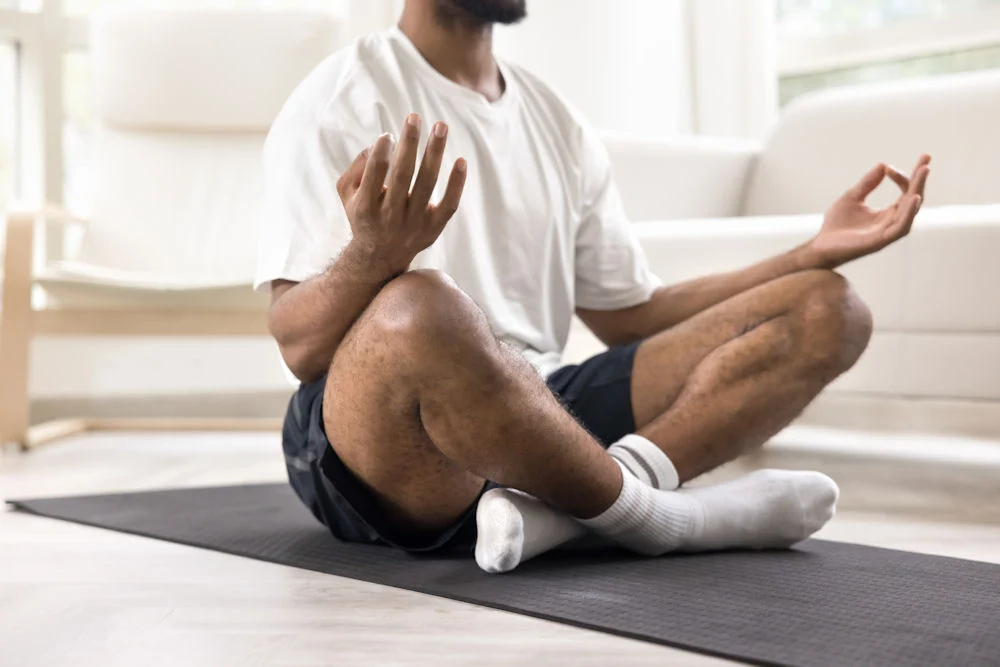Meditation for Addiction Recovery
Mindfulness Rehab in San Diego, California
Recovering from addiction is a demanding process that affects both the mind and body. Recovery may weaken someone’s thinking ability while the mind adjusts to functioning without the substance. Meditation can be an effective tool to help you control emotions and increase mental clarity.
At Bayview Recovery Center in San Diego, California, our rehab provides clients with comprehensive treatment programs and addiction therapy services such as meditation for addiction tailored to their unique needs and circumstances.
What is Meditation?
The holistic practice of meditation has been used for thousands of years. You might have even practiced it without realizing that you were. Many religions use some time of meditation to get closer to or communicate with their Higher Power.
While meditation has many forms, it is usually practiced by quietly sitting and observing your thoughts or body. However, there are other methods.
- Some people concentrate on breathing and feel it swell inside their chest before slowly exhaling.
- Others may focus on their physical experience, listening to their entire body and allowing each perception to exist without judgment.
- Still, others will sit and watch while allowing new thoughts to enter and exit their mind.
Ultimately, meditation is meant to ground you in the moment. Most people say that they felt extremely calm after meditation. Some even fall asleep during their meditation practice. Meditation brings you back to your body and the present moment, allowing you to live now.

What is Mindfulness?
- Subdue your anxiety
- Promote greater self-awareness
- It helps recognize and cope with emotions that may not be reality-based
5 Core Mindfulness Practices
One strength of mindfulness is that you can practice it anywhere and at any time. You don’t have to adopt a particular belief system or invest a great deal of time and energy to take advantage of this expanded awareness. You only need to be willing to try new ways of experiencing the world. Here are five basic practices that are a good way of getting started:
According to The Buddha, “Be where you are; otherwise, you will miss your life.” So, is it possible to be somewhere, and not be there? It is. It’s the way most people live every day. You talk to your kids, watch TV, or sit in a meeting, but your mind is a million miles away. Rarely do we focus on the present moment, going through life on autopilot. Mindfulness is about:
- Being present
- Increasing your awareness
- Opening your eyes to the reality of the moment
Life is stressful. whether it’s your daily grind, a problem relationship, a sudden disaster, or the relentless cycle of bad news. It gets to everyone at times. Feeling constantly overwhelmed can make you retreat from life or worse, turn to drugs or alcohol to cope. Instead of getting upset by things you can’t control, you can center your attention on something that you can control: breathing. Mindfulness teaches you to use your body’s natural healing power to control stress.
“Don’t believe everything you think. Thoughts are just that—thoughts.” Allan Lokos
Most of the time, we don’t give much attention to the thoughts in our heads. They are like white noise that we tune out. And whether we notice them or not, they are the drivers of our actions and feelings. It’s easy to confuse thoughts with reality–to believe that what we think is always true. This can lead to false assumptions, misconceptions, and beliefs not based on fact.
Our beliefs about ourselves and others decide:
- How we present ourselves
- How we interact with people
- How effectively do we manage our lifestyle
Mindfulness teaches you to be aware of your thoughts and let go of harmful beliefs that work against you.
“Only the development of compassion and understanding for others can bring us the tranquility and happiness we all seek.” Dalai Lama XIV. Humans are born to connect. Research shows that when people feel connected emotionally, they thrive mentally. Mindfulness helps you establish connections by teaching you to see yourself and others with compassion, and get rid of the following:
- Stereotypes
- Judgments and prejudices that build walls
- Tolerance, empathy, and kindness build connections
In general, we tend to equate goodness with busyness. The more activities we have, the better we are. Multi-tasking is a virtue. Not exactly. Philosophers have always realized and science has confirmed that there is value in allowing yourself to walk away from the busyness of day-to-day life and simply be. In stillness, you are free to examine the truths that give your life meaning and purpose. You will find the wisdom to be a human being instead of a human being.
Types of Meditation or Mindfulness Techniques
Lie on your back and extend your legs, arms at your sides with your palms facing up. Slowly focus on each part of your body in order. Going from head to toe or toe to head, be aware of any emotions, sensations, or thoughts associated with every part of your body.
Sit comfortably, with your feet on the floor and your back straight and your hands in your lap. Breathe through your nose and focus on your breath moving in and out. IF thoughts or physical sensations interrupt your meditation, mentally take note of it and then return to focusing on your breathing again.
Find a quiet space 10 to 20 feet in length. Begin to walk slowly focusing on the experience of walking and being aware of the sensations of standing and the slight movements that help you keep your balance. When you reach the end of your walkway, turn around and keep walking while maintaining your awareness of your sensations. Many types of yoga are also based on meditative movement.
Meditation and Mental Health
Meditation is an alternative type of therapy that gives individuals a feeling of calm, peace, and balance that can improve overall health including physical and emotional well-being. It’s also commonly used to cope with stress and relax by focusing on calming and helping you stay centered and achieve inner peace.
During meditation, people are clearing away the overload of information that builds up every day and adds to their stress. Science is growing that mindfulness practices like meditation positively affect our mental health. Mindful meditation can reduce:
- Anxiety Disorders
- Depression
- Psychological pain
How Can Meditation and Mindfulness Help Your Recovery?
The regular practice of mindfulness meditation benefits both your physical and mental health by:
- Stress reduction: Mindfulness-based stress reduction has proved to reduce symptoms of stress. The connection between stress and addiction has become well-known and stress increases the chance of drug and alcohol abuse. Clinicians have begun to understand the need to include techniques of meditation for addiction management in treatment.
- Improved mood: Meditation releases dopamine, the “feel good chemical” sought out by individuals struggling with addiction.
- Increases concentration: Individuals who practice meditation therapy feel at peace in the moment. A person struggling to focus on daily activities while craving substances can learn awareness and control of their mental activity through mindfulness.
- Improved sleep: Practicing mindfulness meditation improves sleep and is even useful for treating certain sleep disturbances. One study found that mindfulness meditation can significantly improve your quality of sleep. In cases of withdrawal-related insomnia or depression, meditation can calm the nervous system and enhance sleep quality.
- Reduced risk of relapse: Meditation is a relapse prevention technique that helps to combat symptoms of withdrawal, triggers to use, and cravings.
Discover Meditation for Addiction at Bayview Recovery Center
Meditation is becoming more accessible as a holistic treatment for substance use disorders (SUDs). If you’re a man looking for a transformation in your life, you can begin by contacting Bayview Recovery Center in San Diego, California. We offer holistic therapy that helps support a “whole” person. This includes:
- Mind
- Body
- Spirit
- Emotional well-being
- Social support
- Spiritual Connection
Bayview Recovery Center in San Diego, CA provides comprehensive treatment tailored to the experiences and particular sensibilities of men. We have an experienced, professionally licensed staff of addiction therapists. Their only job is to help you recover from SUD and learn to live a calm, fulfilling life. Being a single-gender program will help you feel more comfortable opening up and honestly discussing your issues. Our treatment programs include:
- Partial Hospitalization Program (PHP)
- Intensive Outpatient Program (IOP)
- Outpatient Program (OP)
- Sober Living
- Transportation to Rehab
Find Your Inner Peace, Heal, and Recover at Bayview Recovery Center


Alyssa is a licensed Clinical Social Worker and received her Master’s degree from San Diego State University. She has experience working with individuals in recovery of all ages for over eight years. Alyssa has also worked with at-risk homeless foster youth transitioning into independent living along with the families in the neonatal intensive care unit at UCSD.
